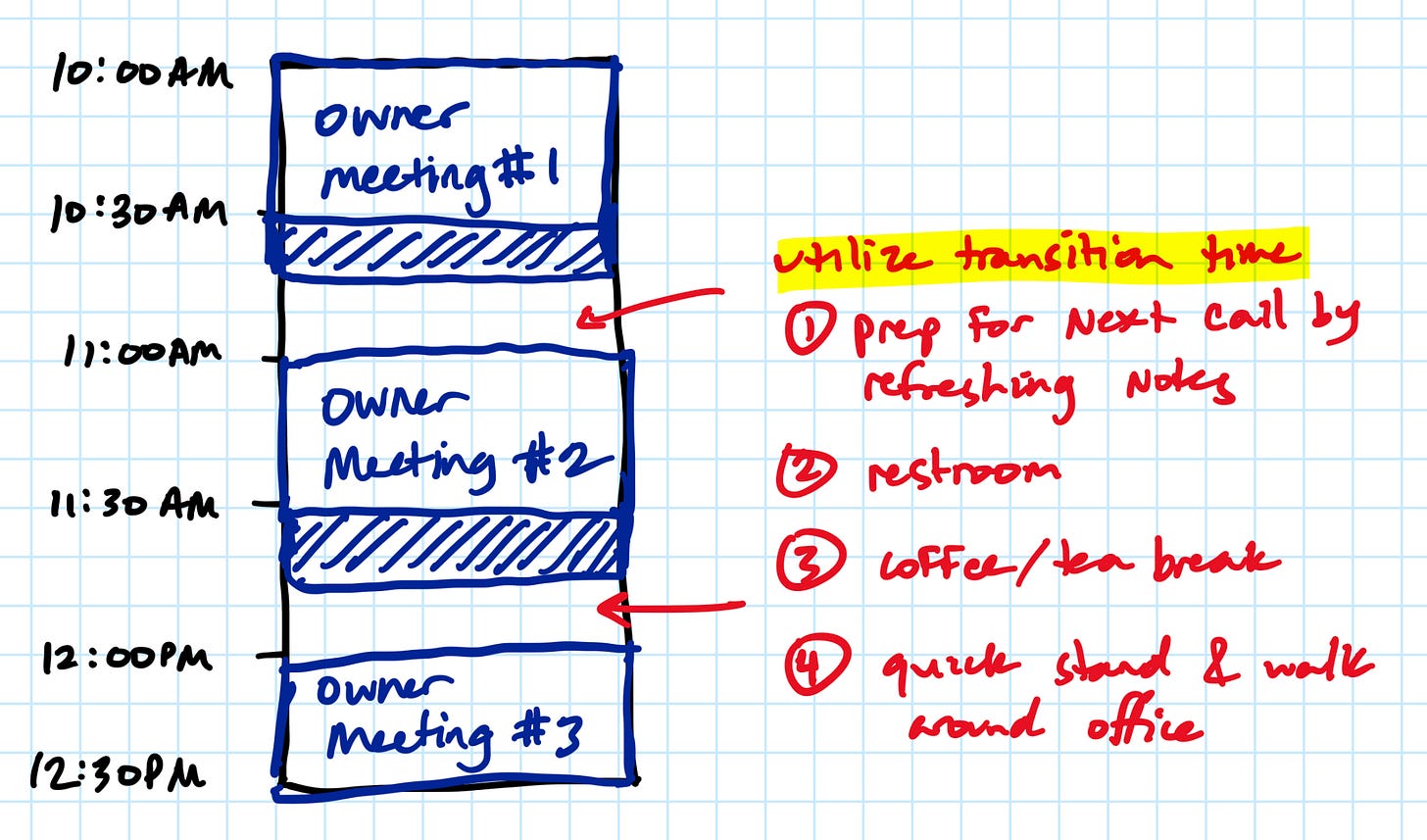As I was preparing to launch my search fund, I wasn’t entirely sure how searchers spent their time throughout the week. I had a clue from asking active searchers and shadowing one over my MBA summer internship, but it was hard to grasp how I would take the theory of acquiring a small business to a repeatable process that I could lean on each week.
If you come from a more structured work environment, you may have enjoyed (or dreaded) the fact that you had investment committee on Monday morning or cross-functional check-ins on Tuesday afternoons. Although we all have been a part of useless recurring meetings, the certainty of them each week brought a bit of structure to your schedule. You can plan your life around them and hold yourself accountable for what those meetings look to achieve (assuming it is productive).
When you start the search, however, you have a blank canvas. No structure whatsoever, just the idea that you need to go out and acquire a business that meets your search criteria. While that can be freeing for the individual exhausted from the monotonous corporate grind, you must consider how you will make the most of your precious time during the search.
I am not here to preach that you need to build some rigid structure to your search but instead to uncover how I typically spend my time each week. We all have our own working styles and preferences for structure, so this will be to showcase what works for me, not to recommend how you should go about searching. If you find elements of my approach helpful, leverage them when you build out your weekly cadence.
Please note that my schedule is highly flexible and variable depending on what is going on each week. The number of owner calls, deals, admin work, and networking will vary, but this boiled-down schedule reflects the core structure of my search.
I’ll follow a week-based schedule by breaking up the week into two sections, Sunday through Tuesday and Wednesday through Saturday. These blocks reflect how I divide my week into more digestible chunks, and they were inspired by an older Stanford GSB case study on best practices for the search phase.
Sunday through Tuesday
I’ve always viewed Sunday as the start of my week and an excellent opportunity to reset physically and mentally heading into the workweek. I try to start every Sunday with a workout (either Peloton or weight training), followed by my morning coffee and cleaning up around the house. After taking things a bit slow in the morning, I look to take advantage of the afternoon by doing life admin, reading, spending time outside or a combination of the three. Towards the evening, I will spend a couple of hours updating my outreach campaigns with new companies, setting up sourcing work for interns, and responding to any emails that came in over the weekend. I may even work on a Maverick piece (like this one).
As the workweek begins, I start my Mondays with a review of email campaign performance to hold myself accountable and help understand the urgency needed to add more contacts to my pipeline. As the day progresses, I will begin receiving responses from business owners and need to email them back to schedule calls for those interested in having a conversation. This activity of responding to owners and scheduling introductory calls is variable and occurs mainly in the front half of the week and outside of working hours, usually after 5 pm central time. My general approach is to contact owners early in the week to schedule a phone call on Thursday or Friday when their schedules typically open up a bit.
Early in the week, I may have calls scheduled from the previous week that I will get on or answer impromptu calls as I receive them. Besides fielding emails and scheduling calls, I spend some time ensuring that interns are clear on deliverables for the coming week through a team check-in and 1-on-1 meetings every two to three weeks. If I need to actively evaluate a deal at a point in time (i.e., financial modeling, industry research, cohort analysis, deal teasers), I will utilize the time between meetings by reading newsletters and other resources on technology, current events, and investing. If I am lucky, I will exercise again on Tuesday, usually a 20-30 minute Peloton ride.
Wednesday through Saturday
Wednesday usually marks the day when there’s a shift in the nature of my day. The back half of the week is typically scattered with owner conversations from Wednesday morning through Friday early afternoon. Layered on top of those are typically networking calls with current and prospective searchers, along with scheduled investor check-ins. I like knowing that the back half of my week will be full of calls, and concentrating on those conversations can help me better organize my time and have blocks to focus on deep 1-on-1 work earlier in the week.
Depending on how many calls are scheduled (and when), working individually and undisrupted for an extended period may become difficult. I don’t like to stack owner calls in 30-minute slots because, although it may make your schedule more efficient, you never know when a call might run long with a qualified lead. So while you may only have two hours of calls scheduled on a given day (four calls), that may require you to allocate four hours of work time to ensure you don’t leave a call abruptly. It’s one thing if you are chatting with searchers or an investor, but another if you are talking with an owner.
Other activities I may focus on towards the end of the week are intern recruitment, revising my email campaigns, email follow-ups, and further industry and business model research.
For someone a bit more introverted than the seasoned used-car salesman, I can be mentally exhausted after many owner calls where I need to be “on”. To help with this, I will try another workout on either Thursday or Friday, depending on my mood, and maybe a nice cheat meal. Sometimes a few pizza slices or Indian takeout hits differently after being told ‘No’ by a handful of business owners.
Most weeks, Saturdays are my off day when I look to enjoy myself and unplug for a bit. In the summer, this is the day I get my golf rounds in, and in other seasons when the weather prohibits it, I do my most intense workouts. While I may work on a Maverick post or read, I prefer to make the most of Saturdays by spending quality time with family and friends at home or being out and about. Also, spending time in nature or exploring the streets of Chicago can be refreshing and spark my creativity.
A quick note on searcher health
You may think, “Cool, David. We get it. You work out and try to live a healthy lifestyle, so what?” or, “Obviously, David. Staying active is important, so why must you add a quick note on this?”
While I am not here to be your motivational speaker or personal trainer, taking care of your physical health will keep your spirits high throughout the tsunami of rejections you will receive during the search. The search is a long, grueling process, and you must approach it more like a marathon and less like a sprint.
Staying mindful of your diet, fitness, and rest patterns will only benefit you as you face rejection. How else do you plan to manage that? Bottling up your emotions, excessive working, binge eating, drinking, or other outlets may provide immediate satisfaction but will only leave you drained by the time you acquire your business. Then, how long can you keep it up when the pressure is greater?
Yes, time is your most precious resource during the search, but you can still pay attention to your health. Balance is key. You can be much more productive during the search than in traditional corporate roles, so take advantage of it by protecting those times to work out, plan your eating, and rest. While I shoot for seven hours of sleep nightly and workouts four times per week, you need to determine what works best for you. The same thing goes for your eating habits. Without a plan for your physical health in your weekly schedule, you’re putting yourself at a significant disadvantage to those doing it.
Recap
It’s hard to capture what happens each week, and that’s the beauty of search. While the activities change when you’re evaluating an opportunity more closely (either crafting the LOI or during due diligence), this structure has provided me with the foundation to remain productive and prevent burnout.
If you want to cut to the chase, here are the ways that I add structure to my week, broken out by Sunday through Tuesday and Wednesday through Saturday:
Sunday through Tuesday
Sunday
Workout (1x)
Read
Life admin
Rest
Email campaign prep
Writing
Monday and Tuesday
Workout (1x)
Email campaign prep
Email campaign performance review
Intern team meeting
Scheduling calls with business owners
Owner calls scheduled from the previous week
1-on-1 intern meetings
Industry and business model research
Wednesday through Saturday
Wednesday-Friday
Workout (1x)
Owner calls scheduled from the current week
Scheduled investor check-ins
Searcher networking
Intern team meeting
Intern recruitment
Saturday
Workout (1x)
Family time
Reading
Rest
Exploring
Writing
Again, this outline does not account for additional activities for specific deal diligence. As a searcher begins to close in on an opportunity, the searcher's workload will shift increasingly to that particular business. The searcher’s schedule during due diligence after executing an LOI warrants a separate post we can write up depending on reader interest. However, one constant thing is the need to carve out time for yourself.




